Residents are paired with one of four family medicine clinics for the duration of their training, where they build their own continuity panels and care for patients of all ages. Each clinic offers a unique mix of urban, suburban, and rural experiences, exposing residents to different patient populations and a broad range of medical conditions. This structure ensures residents develop strong, long-term relationships with their patients while gaining the full-spectrum skills needed to practice anywhere.
Each of our four family medicine clinics offers:
- A full range of care, including maternity services, home visits, and nursing home coverage
- A broad array of procedural experiences
- Low resident-to-faculty ratios that foster close teaching and mentorship
- Opportunities for residents to teach fellow residents, medical students, and other learners
- An integrated electronic health record system, with computer access throughout exam rooms, work areas, and library spaces stocked with educational resources
Each clinic is staffed by:
- Faculty who prioritize resident education as their primary professional focus
- Family physicians with diverse clinical and procedural expertise
- Faculty who also teach medical students and conduct research
- Behavioral science faculty, nurse practitioners, and physician assistants who contribute to patient care and support residents in developing their own practice styles
- Clinic staff dedicated to excellence in patient care and education
- Clinic managers who keep operations running smoothly and actively teach residents about clinic management
UW Health Belleville Clinic
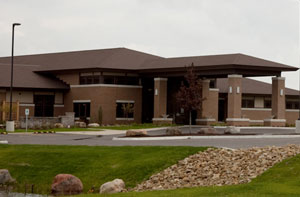 » Belleville Family Medical Clinic
» Belleville Family Medical Clinic
- 12 residents (4 per year)
- Practice setting: Rural
- 15,000 visits/year
Belleville faculty bring a wide range of interests and expertise, including research, leadership, obstetrics, global health, gender-affirming care, addiction medicine, and geriatrics. Clinic staff are deeply involved in the community; most clinical staff—such as medical assistants and nurses—live in nearby small towns and have an intimate understanding of the local area.
A rural health interest is not required to train at Belleville. Residents here enjoy a balanced mix of pediatric, adult, obstetric, and geriatric patients. Many value the chance to care for a rural, underserved population and to gain experience with a wide variety of procedures, including vasectomy and prenatal ultrasound. Belleville residents also manage substance use disorders extensively, including prescribing buprenorphine and naltrexone for opioid use disorder. The clinic serves several counties across southern Wisconsin and northern Illinois and maintains a well-established partnership caring for incarcerated patients. The care team includes a dedicated behavioral health specialist, social worker, pharmacist, and diabetes educator.
The town itself hosts an annual UFO festival each October and offers abundant outdoor recreation, from hiking on the Ice Age Trail to biking along the Sugar River Trail.
Each year, two Belleville residents are selected for the Rural Health Equity Track—a customizable curriculum with a strong community focus and an emphasis on health equity, advocacy, and leadership in rural communities and practices.
UW Health Northport Dr Clinic
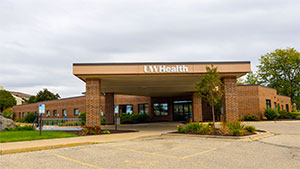 » Northport Dr Family Medical Center
» Northport Dr Family Medical Center
- 12 residents (4 per year)
- Practice setting: Urban
- 28,000 visits/year
The Northport Drive Family Medical Center is a longstanding, thriving practice located near the Dane County Airport in Madison. A core aspect of Northport Drive’s mission is to ensure that care is delivered in ways that are sensitive to the needs of all the clinic’s patients, including significant numbers of Southeast Asian, African American, and Latino patients.
Northport Drive faculty bring a wide range of interests and expertise within family medicine, including disability medicine, chronic pain management, osteopathic manipulation, women’s health, obstetric ultrasound, musculoskeletal research, transgender medicine, and child development. The clinic’s social worker and counselor is on-site five days a week to provide patient care, consultation, and mental health support.
UW Health Verona Clinic
- 12 residents (4 per year)
- Practice setting: Suburban/Rural
- 24,000 visits/year
The Verona Family Medical Center is located about 11 miles from downtown Madison and serves a unique patient population that blends rural and suburban residents, young families, and older adults—offering residents rich exposure to a wide spectrum of patients and medical conditions. Some clinicians are now caring for third-generation family members, reflecting the clinic’s deep community roots.
The clinic embraces many principles of the patient-centered medical home model. Highlights include an on-site community garden, diabetes group visits co-led by residents and faculty, and periodic on-site consultations from specialists to minimize patient travel into Madison. Verona also features a distinctive behavioral health model that provides patients with immediate, direct access to behavioral health services. Strong partnerships with local schools, the Verona Senior Center, the local newspaper, and the police department further enhance the clinic’s community-centered approach.
UW Health Wingra Clinic
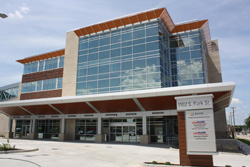 » Wingra Family Medical Center
» Wingra Family Medical Center
- 12 residents (4 per year)
- Practice setting: Urban
- 20,000 visits/year
The Wingra Family Medical Center is the most centrally located of the four clinics, situated in an area of Madison that is medically underserved. Residents gain valuable experience caring for patients in a complex, multicultural environment. Wingra is affiliated with Access Community Health Centers (ACHC), a network of federally qualified health centers (FQHCs), giving residents insight into how FQHCs operate and expanding the range of services available to patients.
Wingra’s patient population tends to be slightly younger than that of the other residency clinics, while still offering opportunities to care for multi-generational families. The clinic features an integrated behavioral health program, with psychologists available on demand and a consulting psychiatrist to support patient care. Its interdisciplinary team also includes a social worker and nurse care coordinator who help ensure comprehensive patient support. On-site pharmacists and pharmacy interns from the UW School of Pharmacy assist residents with medication management. As the outpatient site for the Addiction Medicine Program, Wingra gives residents the chance to work alongside faculty and fellows in caring for patients with substance use disorders. Interpreters are available to support patients when needed, most commonly in Spanish, Hmong, and Cambodian.
Hospitals
For many students, an important consideration in choosing a residency program is whether they prefer training in a setting where family medicine residents are the only full-time house staff or at a hospital with multiple residency programs. Because the Madison residency is a university program primarily based in a community hospital, our residents truly benefit from the best of both worlds. They experience the “high-touch” environment of St. Mary’s Hospital while also enjoying the resources and opportunities that come with being part of the University of Wisconsin Hospital and Clinics and the School of Medicine and Public Health.
St. Mary’s Hospital (SMH)
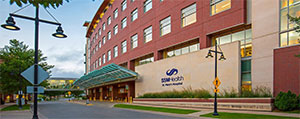 St. Mary’s is a regional community hospital with 440 beds, 671 physicians, and approximately 23,000 inpatients each year. It serves as a major regional medical center, offering state-of-the-art care. Family medicine residents are the only full-time graduate medical trainees at St. Mary’s, allowing them a unique role and visibility within the hospital. St. Mary’s has been a strong supporter of our program since 1970, and family medicine is the largest department in the hospital. Family physicians routinely receive privileges to practice the full scope of family medicine—including obstetrics, intensive care, and specialized procedures—within a patient case mix typical of a full-service community hospital. Residents are respected as integral members of the health care team.
St. Mary’s is a regional community hospital with 440 beds, 671 physicians, and approximately 23,000 inpatients each year. It serves as a major regional medical center, offering state-of-the-art care. Family medicine residents are the only full-time graduate medical trainees at St. Mary’s, allowing them a unique role and visibility within the hospital. St. Mary’s has been a strong supporter of our program since 1970, and family medicine is the largest department in the hospital. Family physicians routinely receive privileges to practice the full scope of family medicine—including obstetrics, intensive care, and specialized procedures—within a patient case mix typical of a full-service community hospital. Residents are respected as integral members of the health care team.
UW Health University Hospital – Madison, WI
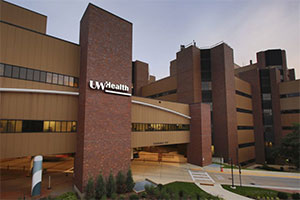 UW Health University Hospital is a tertiary care hospital with 566 beds, more than 1,200 physicians, and about 27,000 inpatients annually. Consistently ranked among the top 50 hospitals in the nation, UW Hospital offers residents exceptional opportunities for learning within a major academic medical center. All of our teaching faculty are part of the UW School of Medicine and Public Health. Residents spend four months of their training on the UW Hospital Family Medicine Inpatient Service—a self-contained service led by our faculty, with senior residents heading the team. Many also choose elective time in specialized outpatient clinics at UW Hospital during their second and third years to gain additional exposure to unique clinical approaches and resources available only in an academic setting.
UW Health University Hospital is a tertiary care hospital with 566 beds, more than 1,200 physicians, and about 27,000 inpatients annually. Consistently ranked among the top 50 hospitals in the nation, UW Hospital offers residents exceptional opportunities for learning within a major academic medical center. All of our teaching faculty are part of the UW School of Medicine and Public Health. Residents spend four months of their training on the UW Hospital Family Medicine Inpatient Service—a self-contained service led by our faculty, with senior residents heading the team. Many also choose elective time in specialized outpatient clinics at UW Hospital during their second and third years to gain additional exposure to unique clinical approaches and resources available only in an academic setting.
Meriter Hospital – Madison, WI
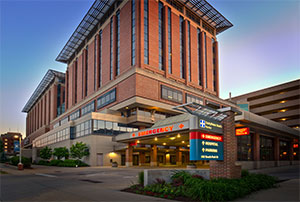 Meriter Hospital is a 301-bed community hospital and a key partner in our residency’s obstetrics training. Operated by UnityPoint Health–Meriter in collaboration with UW Health, the hospital offers high-quality, patient-centered care with a focus on family birth services. Our family medicine residents care for their own continuity obstetrics panel at Meriter, attending deliveries under the supervision of family medicine faculty. OB-Gyn residents also train at Meriter and care for their own patient panel. As one of the few residency programs at the hospital, our residents enjoy strong visibility and meaningful clinical roles. This setting allows for a rich, hands-on learning experience in full-spectrum obstetrics within a supportive, team-based environment.
Meriter Hospital is a 301-bed community hospital and a key partner in our residency’s obstetrics training. Operated by UnityPoint Health–Meriter in collaboration with UW Health, the hospital offers high-quality, patient-centered care with a focus on family birth services. Our family medicine residents care for their own continuity obstetrics panel at Meriter, attending deliveries under the supervision of family medicine faculty. OB-Gyn residents also train at Meriter and care for their own patient panel. As one of the few residency programs at the hospital, our residents enjoy strong visibility and meaningful clinical roles. This setting allows for a rich, hands-on learning experience in full-spectrum obstetrics within a supportive, team-based environment.
Rural Hospitals
First-year residents also gain valuable experience through rotations at rural hospitals, where they complete community emergency medicine and rural surgery preceptorships. Sites include St. Clare Hospital and Health Services, a 90-bed regional community hospital and nursing home complex in Baraboo; Sauk Prairie Healthcare, a 36-bed rural acute-care hospital in Prairie du Sac; and Upland Hills Health, a 25-bed critical access hospital in Dodgeville. These rotations give residents hands-on exposure to rural health care, diverse patient populations, and a variety of procedural experiences in emergency and surgical settings.
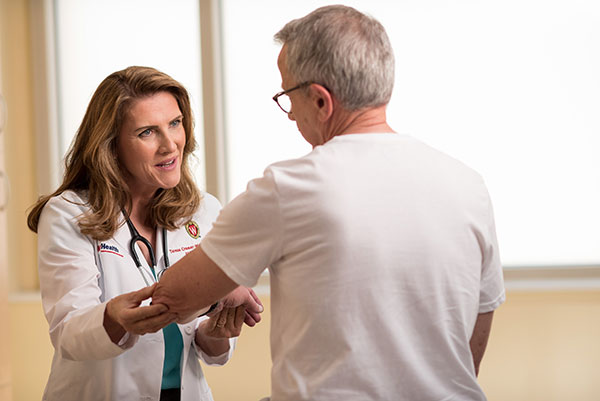
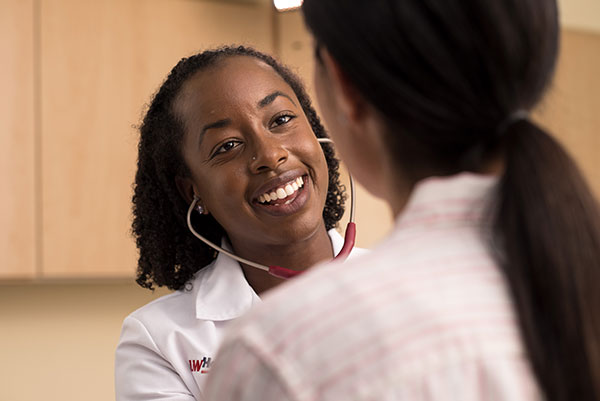
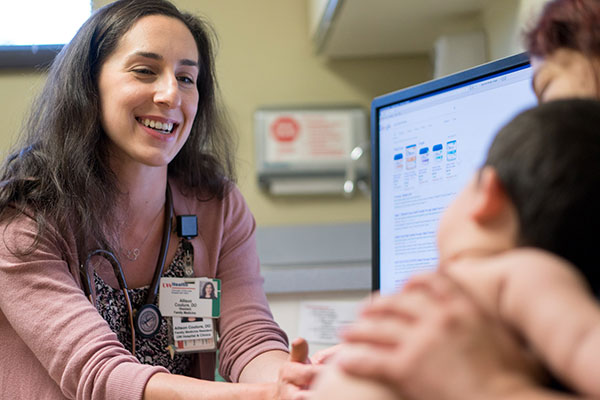

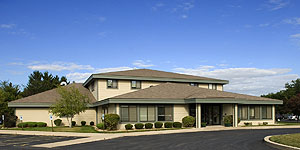 »
»